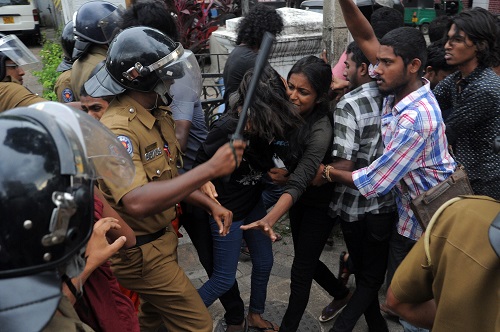The Asian Human Rights Commission is seriously concerned about the attack by the riot police on the students of Inter Student Collective for the Protection of the Higher National Diploma in Accountancy (HNDA), who have gathered to present a petition to the Minister of Higher Education at the University Grants Commission, in Colombo yesterday, 29thOctober 2015.
 According to the spokesperson for the Students Collective, a group of around 500 students had gathered at the University Grants Commission, at Ward Place in Colombo and have requested a meeting with the Minster of Higher Education Lakshman Kiriella to present a Petition and to discuss about the status of the Diploma Course that they have been following. Initially, they were promised a meeting with the Minister of Higher Education but within minutes, they were asked to disperse, by a group of officer from The Riot Police who have used water cannons with tear gas to disperse the students. The students complained that even after they dispersed the riot police followed them and continued to brutally assault them.
According to the spokesperson for the Students Collective, a group of around 500 students had gathered at the University Grants Commission, at Ward Place in Colombo and have requested a meeting with the Minster of Higher Education Lakshman Kiriella to present a Petition and to discuss about the status of the Diploma Course that they have been following. Initially, they were promised a meeting with the Minister of Higher Education but within minutes, they were asked to disperse, by a group of officer from The Riot Police who have used water cannons with tear gas to disperse the students. The students complained that even after they dispersed the riot police followed them and continued to brutally assault them.
A large number of photographs have appeared in the media that show the manner in which, these students have been dispersed and also showing the police attacking some students. The student leaders also complained that 39 students have been taken away by the riot police, and their whereabouts are not known. Despite of repeated inquiries as to the whereabouts of these students, their families have not been able to obtain any information.
According to information available so far, the following questions arise, regarding this incident;
- What made the University Grant Commission authorities, call for the riot police to disperse the gathering of students who have come to express a legitimate grievance, to Minister of Higher Education?
- Was it not the duty of the security authorities of the University Grants Commissions well as the officers of the local police stations to provide protection to the students who were exercising their constitutional rights?
- Was there any role at all, for the Riot Police, on an occasion such as this?
- In any case, what procedure did the Riot Police follow, before the use of tear gas and otherwise use of force, against the students?
- Why did the Riot Police pursue the students and attack them, even after they have dispersed?
- What was the manner in which the Riot Police conduct the arrests of the students; were each of the students arrested, informed about the reason for their arrest, and about their right for protection while under arrest, including their right to receive the help of a lawyer?
- Did the arresting police officers inform anyone, as to where the arrested students have been taken and are being held?
All this and many more very fundamental questions have arisen about the conduct of the Riot Police on this occasion. Given, the record of the Riot Police’s behaviour during the recent past, particularly during the period of the last government, a credible inquiry needs to be conducted by the Government on the behaviour of the Riot Police on this occasion. In the recent past the Riot Police have on many occasions acted in a violent manner and there were reports of even incidents of shooting which resulted in the death of some persons. During the last elections, the Opposition which is now in Government, publicised such events as manifestations of violence used on citizens by the former regime.
The Asian Human Rights Commission is of the view that time has come for a serious review of the manner in which the Riot Police is deployed and what the Riot Police does when they are so deployed.
To participate in peaceful protest is a constitutional right in Sri Lanka, it is also a right recognised under the International Covenant on Civil and Political Rights of which Sri Lanka is a signatory. When the citizens engage in a protest, the duty of the police is to provide protection for the protestors. However, this notion of protecting a peaceful assembly of citizens has been lost in the previous years, where, every protestor has been treated as an ‘enemy of the state’.
Now that the National Human Rights Commission and the National Police Commission, have been appointed, it is their duty to conduct a thorough inquiry into this particular incident and take appropriate action against those who have violated the law.
What is even more important is, to lay down rules relating to the engagement of Riot Police, with the view to stop the kind of conduct of the Riot Police, as was witnessed during the previous regime.